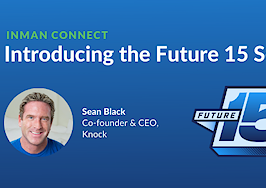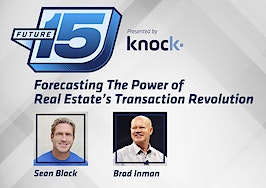In the latest episode of Future 15, host and Knock CEO Sean Black sat down with Zillow co-founder and former CEO Spencer Rascoff. The timing couldn’t have been more perfect.
The recent collapse of Zillow Offers sent shockwaves around the real estate industry. Sean asked Spencer the question everyone is asking, namely, what this means for the future of iBuying, and, more importantly, for investment and innovation in real estate.
You’ll have to watch the full interview to get the best insights, but here are a few key highlights from their conversation.
Zillow’s exit will create more space for other industry innovators
Sean: So iBuying has taken a lot of air out of the room when it comes to innovating on buying and selling homes. My hypothesis is that maybe now more attention and more capital will go to all the other ways in which this transaction is being innovated on. Do you share that view?
Spencer: Hopefully! Investors are going to end up in one of two camps. Some people will say: “Well, if Zillow couldn’t make this work, nobody can. Many others—and hopefully most—will reach the conclusion that, while Zillow decided it wasn’t right for them, this is still a great business model and has enormous consumer appeal and real estate industry appeal. So there’s just going to be a different set of winners in this space. I’m certainly in that camp, but I think investors are still deciding which of those two camps they are in.
Sean: What do you think the impact is to consumers at the end of the day?
Spencer: Well, iBuying solves the time matching problem, which is so critical. The need for most people to sell before they buy. These other products, like Knock, also solve that problem with a different, more asset-light solution. That is a problem that most sellers have. They need some sort of financial product to bridge the purchase of their next home or buy their current home so they can buy their next home. Zillow and all these other innovators over the last couple of years have helped educate the market that this thing exists. There is a way to bridge to the next purchase, either through iBuying or some other financial product. You can’t really put that genie back in the bottle.
The future continues to sit with companies that take friction out of real estate transactions
Spencer and Sean both believe that the winners of the transaction revolution will be those companies that focus on creating a seamless transaction. Much like Airbnb allows for renting a property with the tap of a button, companies like Knock and Pacaso aim to create a similar reality for the purchase of a home. Here’s what they have to say on the matter:
Sean: Obviously, home buying and selling is pretty broken. It’s fragmented, expensive, opaque. There are all sorts of adjectives we could use. So, what’s next? What else is on the horizon?
Spencer: Themes that I’m investing in, generally speaking, are companies that take the friction out of that transaction. It’s cool to see all the innovation that’s happening. Nobody’s really woven it all together. Zillow had the best shot at doing that and they’ll probably partner with some other companies to piece that together. But, it’s an exciting time to be in proptech because there’s so much innovation happening. It feels like we’re really close to this transactional unlock.
For Spencer, the question remains: what is the best channel for taking these innovations to market?
Spencer: The big question — and [Knock] is living this every day — is to figure out what the right go-to-market is for greasing the skids of the transaction. Knock has chosen an agent channel to go-to-market, which I think is really smart. Others are trying to go direct-to-consumer.
In Spencer’s eyes, which strategy will win out remains to be seen. However, it is clear that major innovators in the space, such as Knock, are placing their bets solidly with agents.






